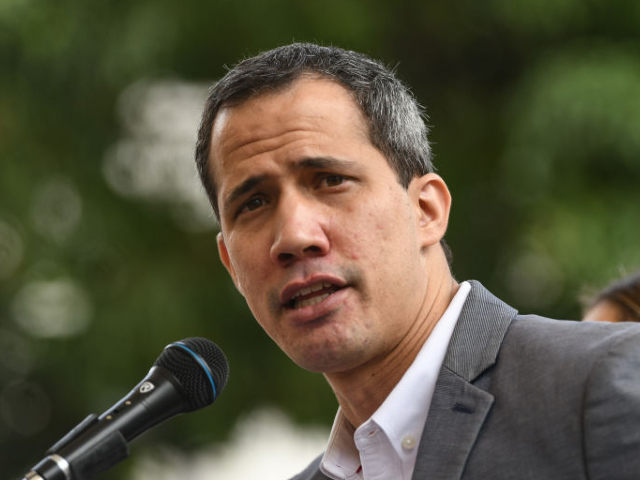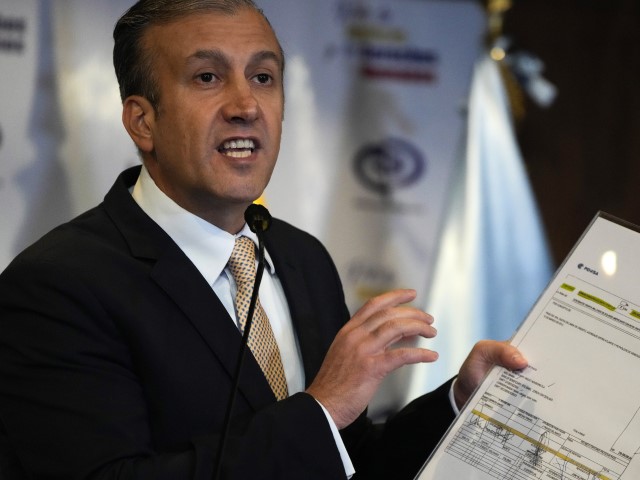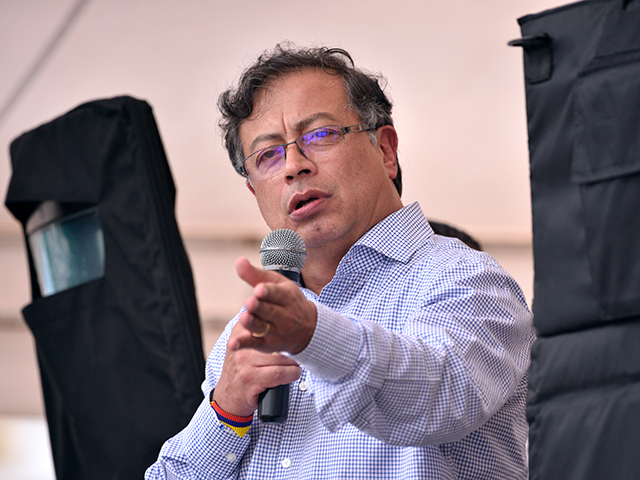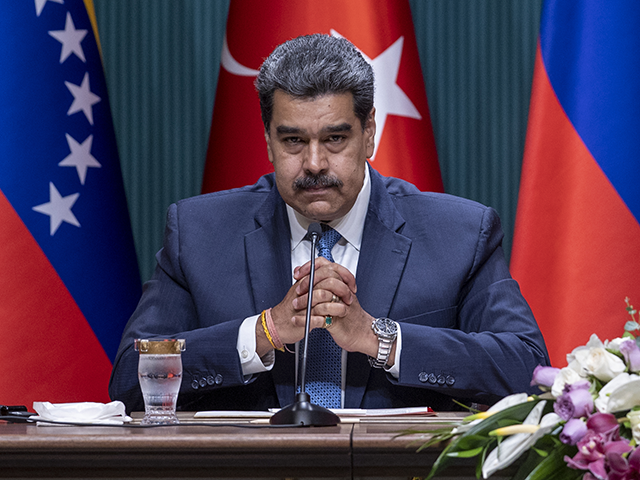Venezuelan socialist Oil Minister Tareck El Aissami – a U.S.-designated drug kingpin – announced on Thursday that his regime has formally requested 23 “international warrants” and contacted Interpol to arrest legitimate President Juan Guaidó and the former president of Colombia, Iván Duque.
El Aissami did not specify what he meant by “international warrants” – i.e., which country would be issuing the warrants – nor did he explain what role the socialist regime is expecting Interpol to play. He did claim that Interpol would issue “red notices,” or requests for arrests, for the individuals involved. Interpol does not have the power to arrest anyone, but can urge member states to use their sovereign powers to do so.

Juan Guaido, president of the National Assembly who swore himself in as the leader of Venezuela, speaks during a press conference in Caracas, Venezuela, on Thursday, March 17, 2022. (Carolina Cabral/Bloomberg/Getty Images)
El Aissami accused the group, which also included socialist opposition leader Leopoldo López, of hatching a plan to “steal and dismantle” the Colombian-Venezuelan petrochemical company Monómeros.
Monómeros — a subsidiary of Venezuela’s state oil industry, Petróleos de Venezuela (PDVSA) — is a petrochemical company located in Colombia that produces fertilizers, phosphates for cattle feed, Caprolactam, and other products. The company’s importance derives from the fact that by 2021 it was producing 40 percent of Colombia’s national fertilizer market.
El Aissami – who has been accused of having ties to the terrorist organization Hezbollah and for whom the U.S. Department of State has an active $10 million bounty on over drug trafficking charges – claimed that the Maduro regime has denounced and submitted “evidence” of an alleged plan to “steal” the company involving all accused, while also claiming those involved had improperly run the company.

Venezuela’s Petroleum Minister Tareck El Aissami speaks during a press conference at the Public Ministry, in Caracas, Venezuela, Tuesday, Aug. 30, 2022. (Ariana Cubillos/AP)
According to El Aissami, the Maduro regime also found evidence of the creation of “shell” corporations that allegedly provided Monómeros with advice to justify the payment to relatives of opposition leaders.
“They are the first to come out to talk about democracy and transparency and they are a bunch of criminals,” he said.
In 2019, during the height of the political crisis derived from socialist dictator Nicolás Maduro holding sham presidential elections in 2018 and his refusal to step down, the administration of Juan Guaidó — who assumed Venezuela’s presidency as per the country’s constitution — took control of the company until August 2022.
Far-left Colombian President Gustavo Petro, 48 hours after assuming the presidency, ordered control of the company be returned to the Maduro regime. Petro and his administration do not recognize Guaidó as Venezuela’s legitimate president. Petro has described Guaidó as a “nonexistent president.”

Colombian then-presidential candidate for ‘Pacto Historico,’ now President Gustavo Petro, speaks during a campaign rally on May 11, 2022 in Fusagasugá, Colombia. (Guillermo Legaria/Getty Images)
Petro’s administration has expressed its intention to purchase a controlling 51 percent of the petrochemical company from the Maduro regime. The company had been sanctioned by the Trump administration in 2019 while under control of the Maduro regime, but under Guaidó’s control was granted an operating license recently extended until June 2023.
Under Guaidó’s control, the Colombian-Venezuelan petrochemical company was marred by grave accusations of corruption. In 2021, the Colombian Superintendency of Corporations released a resolution that revealed that Monómeros had failed to comply with some of the country’s money laundering and terrorist financing risk self-management obligations. The report also revealed that the company’s cash flow was in the negative as of August 2021, with outstanding debt to foreign suppliers that amounted to more than $129.6 million.

A worker rides a bicycle by a sign of Venezuelan fertilizer company Monómeros, in Barranquilla, Colombia, on October 9, 2021. (JUAN BARRETO/AFP via Getty Images)
In August 2022, the Venezuelan opposition-led National Assembly, which was ousted by the Maduro regime in 2020 through a sham election, found itself at odds after certain opposition political parties partially blocked a report that addressed the corruption accusations during the control of the Guaidó presidency.
The report, while detailing the “political responsibility” of Guillermo Rodríguez Laprea, who Guaidó designated the General Manager of Monómeros, excused Guaidó of any corruption allegations.
Venezuelan opposition leader Leopoldo López, who is currently in exile in Spain, released a statement on his personal website dated September 18 denying the Maduro regime’s accusations.
El Aissami affirmed on Thursday that the Maduro regime has “the complete and absolute control of the Monómeros plant in Colombia.” El Aissami asserted that, now that Colombia has resumed judicial cooperation with the Maduro regime, he expects that some of the accused who are still living in Colombia will be extradited to Venezuela.
“We hope that they will be captured and placed at the disposition of the Venezuelan justice system,” he stated.
Christian K. Caruzo is a Venezuelan writer and documents life under socialism. You can follow him on Twitter here.

COMMENTS
Please let us know if you're having issues with commenting.